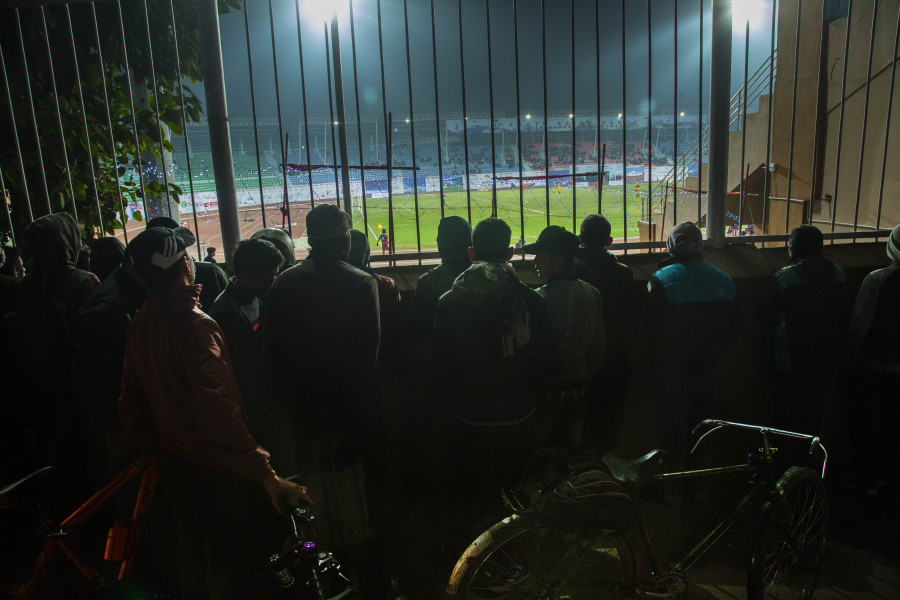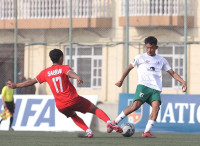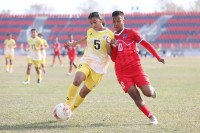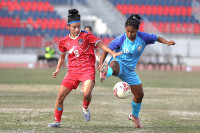Football
Team Nepal left with inadequate break between matches as organisers rejig men’s football fixtures again
Karma Tsering Sherpa, president of the country's football governing body, points out time constraints as the cause.
Prarambha Dahal
The All Nepal Football Association revised the fixtures for men’s football competition under the 13th South Asian Games yet again on Monday after the previous tie-sheet came under fire from coaches of the participating teams over lack of rest for the players.
This is the third time that the association has released the tie-sheet in the last five days. ANFA, which is responsible for holding the football competition in the Games, had initially come out with a fixture involving India.
In that schedule, six participating nations were divided into two groups with the top two teams making it to the semi-finals.
“The latest revision in the tie-sheet was made following consultations with the managers and coaches of the participating teams,” said Arjun Bahadur BK, secretary of the technical committee of the 13th South Asian Games on Monday.
“We understand that playing a match every other day is not appropriate for the fitness of the players and even for the success of the event. But we had no other options because of the time constraints,” he said.
The coordinator of the committee, Ganga Bahadur Thapa, was not immediately available for comment.
Maldives’ head coach Petar Segrt, who had complained about the tight schedule on Sunday, expressed his gratitude to the organising committee for their consideration.
“I’d like to thank the hosts for listening to our concerns and addressing them. The health and fitness of our players should be of major concern to everyone,” Segrt said. “The tournament will be devoid of the expected high standard if we were to follow the previous schedule.”
Based on the previous schedule, the Maldives were set to play back-to-back matches on Monday and Tuesday followed by clashes on Thursday and Friday.
The tie-sheet was initially amended after India pulled out from the football competition. The organising committee then came up with another revised format for the tournament based on which hosts Nepal, Sri Lanka, Bangladesh, Bhutan and the Maldives were to contest in the round-robin format. While the organisers have stuck with the same format with the top two sides competing for the gold medal and the third and fourth-placed teams playing a bronze medal play-off.
Acknowledging the concerns of the coaches, ANFA President Karma Tsering Sherpa said, “As per the international practice and regulations of FIFA and AFC, a team is entitled to a minimum break of 48 hours between two matches. However, we were under pressure to conclude the football tournament by December 10. That left us with no choice.”
“When we have only five participating nations, the tournament has to be played in a round-robin format. The delay in registrations and the withdrawal of a team has led to this situation,” Sherpa said. But he continued to insist: “This is not the first time the nations are playing without a 48-hour gap, Nepal had played the semi-final and final matches in Guwahati during the 12th edition of the Games with a shorter break than what was stipulated in the FIFA regulations.”
“We have already informed FIFA and the AFC about this issue. The participating South Asian nations are happy about the fact that the Games are being held, so this should not be a big issue. As hosts, we are trying to make it comfortable for our guests,” the ANFA chief added.
The latest change means Nepal will have to play two matches without proper rest on two occasions. They take on Bhutan on Tuesday and face Sri Lanka the following day.
As per the previous fixture, the home team were to play the Maldives on Friday, December 6 with a 48-hour break. However, the new tie-sheet has marked December 6 as a rest day with the fixture rescheduled for December 7. Previously only one match between Sri Lanka and Bhutan had been scheduled for December 7. On December 8 will see Nepal again taking to the field, against Bangladesh.
On Nepal’s tight schedule, head coach Bal Gopal Maharjan said, “The tie-sheet does not follow international practice. But this is a consequence of the lack of stadiums with international standards in the country. There might have been some loopholes in planning.”
But after complaints from other participating coaches, Maharjan said, Nepal cannot seek all advantages as the hosts.
“We have the home crowd behind us. They are waiting for our matches to begin,” he said.




 13.12°C Kathmandu
13.12°C Kathmandu










